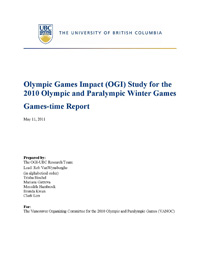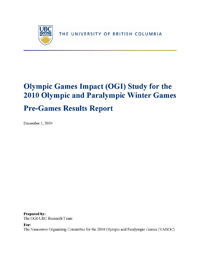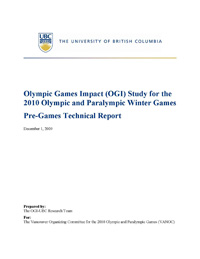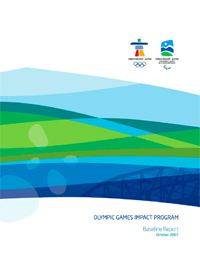The Centre for Sport and Sustainability is pleased to house the Olympic Games Impact (OGI) Study Reports for the Vancouver 2010 Olympic and Paralympic Games. The OGI project is now required of all Host Cities by the International Olympic Committee (IOC). The project has three main objectives:
- To measure the overall impact of the Games;
- To assist bidding cities and future organizing committees to maximize the benefits of the Games; and
- To create a comparable benchmark across all future Games.
OGI is an indicator-based monitoring and reporting system that is grounded in the concept of sustainability. OGI uses 126 indicators to measure the economic, social, and environmental conditions of the Host City/Region/Country. There are 80 context indicators, and 46 event indicators.
Each Games organizing committee is to present its findings in a series of four reports (baseline, pre-Games, Games-time, and post-Games) that spans 12 years, beginning two years before Host selection and ending three years after the Games. The final post-Games report, planned for 2013, will look at the long-term impact of the Games.
OGI Post-Games Report
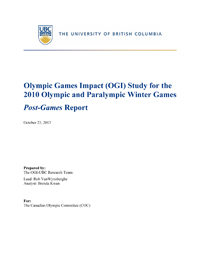
This final report interprets indicator data over the entire reporting period (2001-2013).
Download the Report
View the UBC Press Release – October 23, 2013
In the media
Print: Xinhua; Globe and Mail; Post-media news; Vancouver Sun; Times Colonist; Metro Vancouver; VanCity Buzz; Whistler Question
Radio: News 1130; CKNW (starts at 10.50 mark)
OGI Games-time Report
This report focuses on Games-time Event indicators and impacts.
Download the Report
View the UBC News Release – October 25, 2011
OGI pre-Games Results Report
This report provides the OGI indicator results in the pre-Games period.
Download the Report
View the UBC News Release – December 1, 2009
OGI pre-Games Technical Report
This report describes the indicators that comprise OGI.
Download the Report
OGI Baseline Report
Includes measurements of the region 9 years before the Games (2001).
Download the Report
